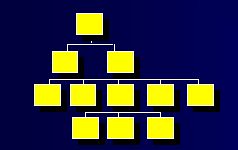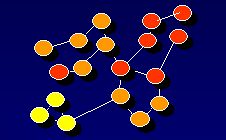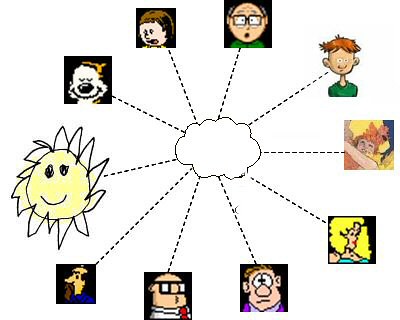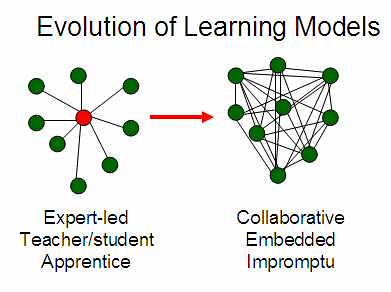Sunday, April 03, 2005

The business world is going through a lot of thrash these days. Bits move faster than atoms, too fast for our industrial-age models to keep pace. Yet top-down organization brought us the wealth we enjoy today, so it's difficult to give it up whether or not it has passed its prime.

Networks are wonderfully self-organizing and democratic. (Let's all share!) But when you want guidance, there may be no guide. The trends point to a future where we're each our own person and we manage ourselves. We can't blame the boss if he's no longer there.
The new world order is that we're all in this together. Instant communication puts us on equal footing.

I've been re-reading passages from Tom Malone's The Future of Work and Tom Stuart's Intellectual Capital. It's sobering to realize how much knowledge erodes over time. I'd swear I never saw many of these pages before, but I know I read every word. Whatever.

Malone tells us the natural evolution of networks starts with nodes linking to a single authority (the king, the tsar, the instructor, the mainframe), and, as the cost of connections drops, the nodes reach out to one another to form dense connections, making the center no longer discernable (yielding the flat organization, business as ecosystem, and democratic governance).
Stewart, then a reporter for Fortune magazine, calls it a revolution, writing, "Information and knowledge are the thermonuclear competitive weapons of our time. Knowledge is more valuable and more powerful than natural resources, big factories, or fat bankrolls. In industry after industry, success comes to the companies that have the best information or wield it most effectively--not necessarily the companies with the most muscle."
Work is fundamentally different now from what it was in, say, 1980. Back then there were rules, bosses, and roles to play. Most workers followed the script. Factory-era assumptions about organization (hierarchical, top-down), productivity (proportional to hours worked), assets (ownership is good), the workforce (on our payroll), and so forth were de rigeur.
These days most of us are knowledge workers. We have discretion in what we do. We interpret values instead of following rules. Hell, things change so quickly, nobody's got time to write new rules. Most of the value added by business is intangible; we manipulate bits, not atoms. Global communication is instantaneous. Corporation missions morph overnight, like some sort of magic mushrooms. We of us finds our own path.
Learning has changed, too. I started my career upon graduating from college by driving to company headquarters in Dayton, Ohio, and studying programming in a motel classroom for six straight weeks. Not long after, I had to memorize -- yes, word-for-word -- a twelve-page script for demonstrating a ten-key adding machine and perform it in front of the dozen people I worked with. I never used any of these skills, so my new-found knowledge dissipated rapidly.
Wow! Can you imagine dedicating six weeks straight to learn anything? People don't have time for 45-minute courses. Ten minutes is often too long. We want learning bites. How about trying to learn mainframe machine language by lecture? We weren't allowed to see if our programs actually worked until the last week of the ordeal.
The company was NCR, and were we ever proud of our past. Company founder John Patterson bought the patent for the cash register, which no one thought they needed, and convinced just about every store, restaurant, grocery, and beauty shop in America they needed one. Our market share was something like 96%. We were taught that Patterson invented salesmanship. Patterson had his secretary record the sales pitch of his #1 salesman, Tom Watson, who went on to found IBM. Then every sales person had to memorize the script and demonstrate their capabilities at a company boot camp.
Two vignettes and then I'll move on. One day my class of eighteen went to headquarters for a factory tour. We were ushered into an immense building. It felt like a dimly lit aircraft hangar. Working away were hundreds upon hundreds of machinists, each huddled over a partially-assembled cash register illuminated by a small, intense lamp. Row after row of workers were filing gears which would keep the day's totals in the register. In the late sixties, I was whisked back for a vision of the Industrial Revolution. Factory thinking permeated the company culture. We computer guys rarely got along with the register guys and vice-versa.
We were in awe of our corporate leadership. Robert Oelman was chairman of NCR at the time. I was dating the hostess from the cocktail lounge at our motel, the Boom-Boom Room. (This was not as lurid as it sounds.) Oelman's daughter was one of her best friends. I fantasized about meeting the Big Guy. It never happened, but I would rather have met the man than Brigette Bardot and Catherine Deneuve combined.
 At NCR, we paid too much attention to the past. We were always out to score another monopoly market. Our goal was to install Total Systems, sort of an all-encompassing hydra that would envelope the customer's operations and be competitively unassailable.
At NCR, we paid too much attention to the past. We were always out to score another monopoly market. Our goal was to install Total Systems, sort of an all-encompassing hydra that would envelope the customer's operations and be competitively unassailable.Now the pendulum of business may have swung too far in the opposite direction. It's every man (or woman) for himself (or herself). Three or four years ago at TechLearn, Diane Hessan said that from here on, we each have to be our own instructional designers. Personally, I love the freedom, but I know the lack of direction is generating untold amounts of stress and unhappiness for workers who feel the game is changing while they're trying to play it.
 I've been thinking about informal learning a lot lately. Sometimes it's ambient: you learn by doing something accidentally or by making a mistake. Sometimes it's on purpose: you Google a needed answer. Often it's social: you learn to be a geek by hanging with other geeks. Sometimes it's by inspiration -- Asked why he was an optimist, in spite of his negative writing, the author answered, "I'm an optimist because it works better." I've been in his camp ever since.
I've been thinking about informal learning a lot lately. Sometimes it's ambient: you learn by doing something accidentally or by making a mistake. Sometimes it's on purpose: you Google a needed answer. Often it's social: you learn to be a geek by hanging with other geeks. Sometimes it's by inspiration -- Asked why he was an optimist, in spite of his negative writing, the author answered, "I'm an optimist because it works better." I've been in his camp ever since.Teachers and classes and workshops don't figure in my personal learning much. I used to explain the learner-centric approach with a chart showing a learner in the middle surrounded by an instructor, courses, connections to peers, readings, and so forth. That's obsolete. It's not the correct context. Where was that person's learning cockpit, anyhow? Not amid the cacophony of the office. Not in an isolation booth somewhere. And why is there only one person in the center instead of a handful of people? And wouldn't it be more apt to think of the learner(s) simply interacting with the world rather than being cooped up in some "learning environment?"
Denham Gray has written a thought-provoking piece on redefining learning. Denham's bottom line: "The key to learning is not the medium nor the message, it is the quality of the dialog with your peers that really matters."
I take it one step further. It's not just your peers; it's the qualify of connections with anyone whose community is important to you. Learning means making better connections.
These thoughts were roaming around in my mind yesterday when I dropped by Half Price Books in Berkeley yesterday. I fully believe in serendipity. When I'm exploring a topic, I'll often wander into a bookstore and find just the information I am looking for. In this case, Harlan Cleveland's Nobody in Charge leaped out at me. I'll return to this topic as I read it.
Anyone else thinking these thoughts?
I'm back. Just finished scanning Cleveland's book. It didn't provide the perspective I was looking for although it did make a passionate case against departmental silos on the campus:
...Vertical academic disciplines, built around clusters of related research methods, are not in themselves very helpful in solving problems. It's all too noticeably true -- no real-world problem can be fitted into the jurisdiction of any single academic department. But doesn't the new knowledge environment place a much greater premium on integrative thought?









1 Comments:
Bill, I look forward to your ping. If we can figure this one out over a cup of coffee, meet me at Starbucks.
Today I posted Roger Schank's comment that “People who learn on their own learn exactly what they find interesting and potentially useful.” I have to question whether they're going to learn anything at all simply because it supports organizationally developed learning objectives. In the future, sound leadership practice will be to demonstrate the congruence of personal and organizational prosperity.
John, you knew John Lee Hooker? Now, that's cool. What a guy!
Post a Comment
<< Home